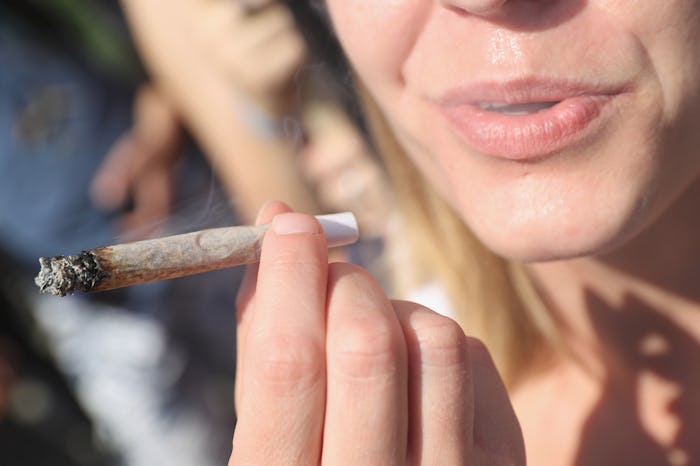Life

More Pregnant Women Are Smoking Pot, New Study Says, But Is It Safe?
It may not come as a surprise that more pregnant are smoking pot, according to a study published Tuesday in the Journal of the American Medical Association. Twenty-nine states and the District of Columbia now have laws that legalize marijuana in some form but, legal or not, people have always used marijuana to treat everything from stress to nausea. This new research suggests that expecting women are smoking to ease heightened anxiety, nausea, and morning sickness, which all accompany pregnancy.
The researchers asked a sample of expecting Californians to complete questionnaires about their marijuana use and also asked to take toxicology test specifically for cannabis during standard prenatal care visits from 2009 to 2016. The women were screened for marijuana use at approximately eight weeks into their pregnancy, and the results show that the prevalence of marijuana use increased from 4.2 percent to 7.1 percent in that timeframe.
The data suggests that the upward trend is most common among pregnant teens younger than 18 — for them, usage climbed from 12.5 percent to 21.8 percent. Among pregnant women 18 to 24, 9.8 percent smoked pot in 2009 and 19 percent smoked pot in 2016. While the increase in marijuana use for older age groups was still evident, it wasn't as steep; it rose from 3.4 percent to 5.1 percent among women 25 to 34 years old and from 2.1 percent to 3.3 percent among women older than 34.
The research isn't exactly holistic, as it only involved 279,457 mothers-to-be, 12 and older, who were in the Kaiser Permanente Northern California healthcare system, according to CNN. The study's lead author, Kelly Young-Wolff, licensed clinical psychologist, also told Fox that the researchers were unable to distinguish prenatal use before versus after women realized they were pregnant. Marijuana is detectable in urine approximately 30 days after last use and varies with heaviness of use and marijuana potency, she wrote in an email to Fox; it is, therefore, unlikely but still possible that some toxicology tests identified pre-pregnancy use.
That said, a separate study published in the same journal in January 2017 found that 18- to 44-year-old pregnant women from the United States who reported smoking marijuana in the previous month grew from 2.37 percent in 2002 to 3.85 percent in 2014. There's no denying that marijuana usage is on the rise, and it's not entirely shocking that pregnant women are smoking more. After all, a January 2017 report from the The National Academies of Sciences, Engineering, and Medicine found substantial evidence that cannabis can be an effective treatment for chronic pain, which the reports suggested is “by far the most common” reason people request medical marijuana.
So while most healthcare professionals warn against pot smoking to treat pregnancy pain and symptoms like anxiety, nausea, and morning sickness, pregnant women are doing so nonetheless. It's therefore imperative that they understand the potential risks.
For one, Babycenter.com warns that weed could be contaminated with other drugs or herbicides that could prove harmful to babies, even if purchased legally. This is because some dispensaries claim that their products have been approved or certified, but dispensaries aren't closely regulated. But even if the weed isn't contaminated, it can still be potentially bad for babies.
The effects of marijuana on a fetus remain unclear but could include low birth weight and development problems, according to the Centers for Disease Control and Prevention. Smoking marijuana (or tobacco, for that matter) raises carbon monoxide levels in your blood, which can reduce the amount of oxygen that a developing baby receives and, consequentially, affects the baby's growth, BabyCenter.com explained. Whether smoking or consuming edibles during pregnancy, anywhere between 10 to 30 percent of the chemical tetrahydrocannabinol (THC) in marijuana can also pass through a mother's system to that of her baby — and babies are much more vulnerable to chemicals and toxins than adults.
After babies are born, a wealth of studies also shows that prenatal marijuana exposure is linked to cognitive deficits. These children have shown trouble solving problems, controlling impulsivity, remembering, planning, and being attentive.
"Researchers don’t know a lot about what the effects might be and while the research is in progress, most experts advise pregnant women not to use marijuana," the CDC advised.
The American Congress of Obstetricians and Gynecologists, for example, recommended that, in the absence of sufficient data, "women who are pregnant or contemplating pregnancy should be encouraged to discontinue marijuana use" and "to discontinue use of marijuana for medicinal purposes in favor of an alternative therapy."
As more states move to legalize marijuana even just medically, it's important that, like any medicine, expecting women consult their healthcare professionals before smoking while pregnant.
Editor's note: After publication, we discovered this article did not meet our editorial standards. There were portions that did not correctly attribute another source. It has been updated to meet our standards.
Check out Romper's new video series, Romper's Doula Diaries:
Watch full episodes of Romper's Doula Diaries on Facebook Watch.